Latest News
World Mental Health Day
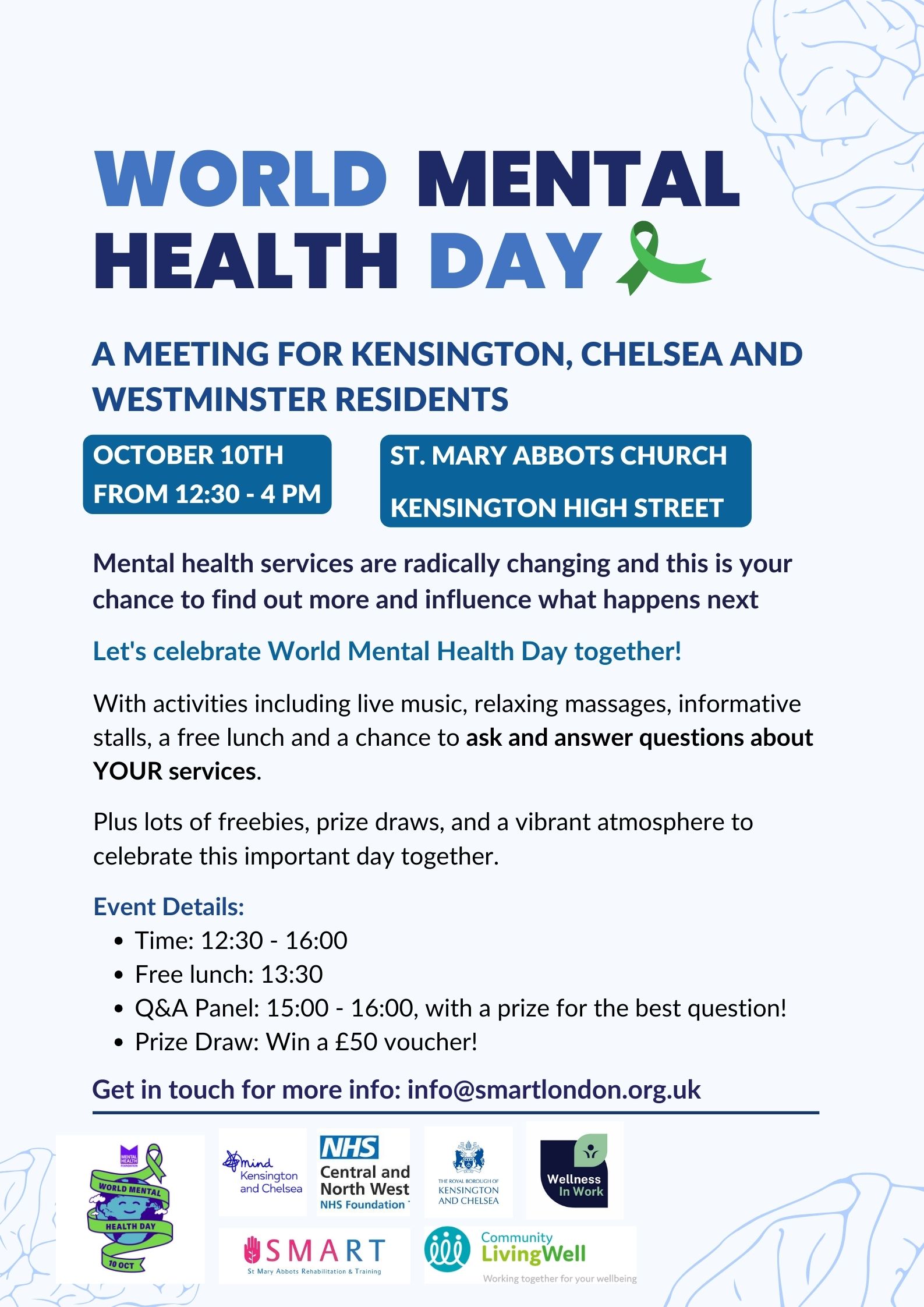
Author: Oliver Dent
Category: Uncategorised
Posted on: 25th September 2024
Men’s Zone at the Summer Games Day
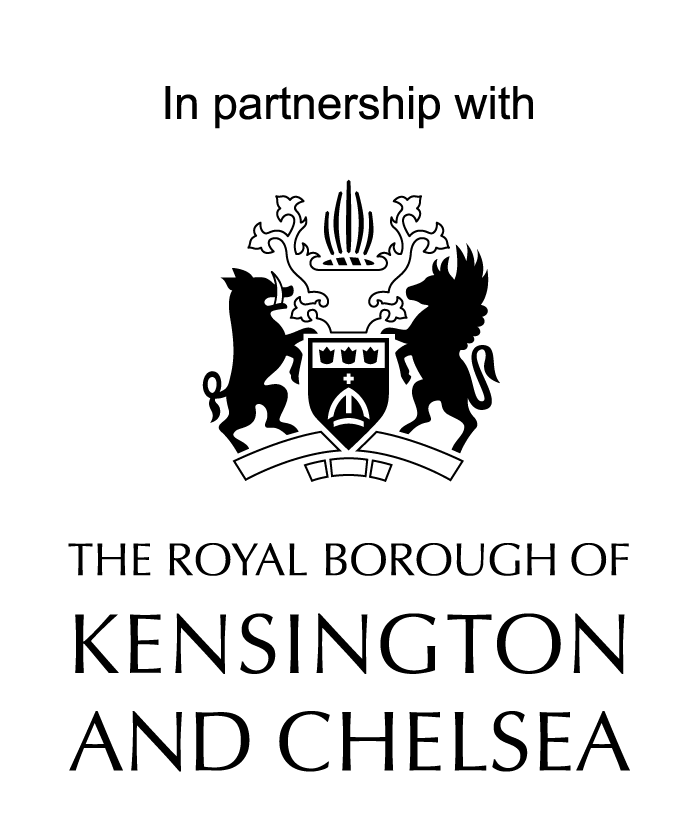 Men’s Zone at the Summer Games Day – Sunday 28 July from 10.30am to 4pm Holland Park W14 8NB
Men’s Zone at the Summer Games Day – Sunday 28 July from 10.30am to 4pm Holland Park W14 8NB
The nearest entrance to the Men’s Zone is off Illchester Place.
Attention all men! Don’t miss out on visiting the Men’s Zone At the Summer Games Day. Have free health checks, Football with Chelsea FC, plus Access to A free haircut and enter in competitions for prizes, Plus much more brought to you by Community Living well
The Men’s Zone is brought to you in partnership with Minds United FC, Chelsea FC, Community Living Well, QPR FC, RBKC, Strengthening Kensington Youth and Family, Grenfell Health and Wellbeing Service, Lung, Prostate and Bowels Cancer UK, OneYou, Age UK, Dalgarno Trust. Access to free Hair Cuts by Raisa’s Barbers featuring the TrimTalk project, supported by the Mayor of London, Veteran football, Health Checks, Imperial plus much more!
To find out more information about the Summer Games Day, please visit Holland Park | Royal Borough of Kensington and Chelsea (rbkc.gov.uk).
A sample of free male focused activities in the Men’s Zone:
Chelsea FC & QPR FC
Work on your football skills with Chelsea FC and QPR FC
Community Living Well
Jump Rope for Mental Health:
We’ll explore how jumping rope can help to improve your mental health and provide tips for incorporating jump rope into your routine. The benefits of jump rope for mental health are numerous and include stress relief, mood improvement, and brain health. Discover how you can improve your Mental wellbeing with K&C NHS Talking Therapies and take a rope away for you to add movement into your daily activity.
Open Age
Steady and Stable: Designed specifically for people over 50, is a 38-week programme that helps prevent falls by enabling older people to improve their balance, strength and coordination. Steady and Stable is here for anyone who feels wobbly on their feet, anxious about walking or who is at risk of a fall.
Tai Chi: also called Tai Chi Chuan (Tai Ji Quan), is a defensive martial art and fitness regime using a series of controlled movements to develop a healthy body and tranquil mind. It is believed to have originated in the Wudang area of China in the 17th century, but has evolved into many different forms. Today, one of the most practiced is the Yang Short Form. Its practice can lead to many health benefits including improved stability/balance – both mental and physical – agility, relief from stress and an increased sense of well-being.
Raisa’s Barbers featuring the TrimTalk project
Find out about how to access free haircuts for Men and how the TrimTalk project can improve your mental wellbeing
Free Health Checks
Free check-ups of your overall health. That can tell you whether you’re at higher risk of having health problems, such as:
- heart disease
- diabetes
- stroke
 Minds United FC
Minds United FC
improving mental health through football.
Minds United FC have created the first mental health Team England to participate in the first European men’s mental health futsal tournament in Rome, this September. See link below
InHealth
Lung Health Check Programme and quiz for men to try
SKYF
Brings you the Neymar Challenge
Plus much much more!!!
We hope to see you there
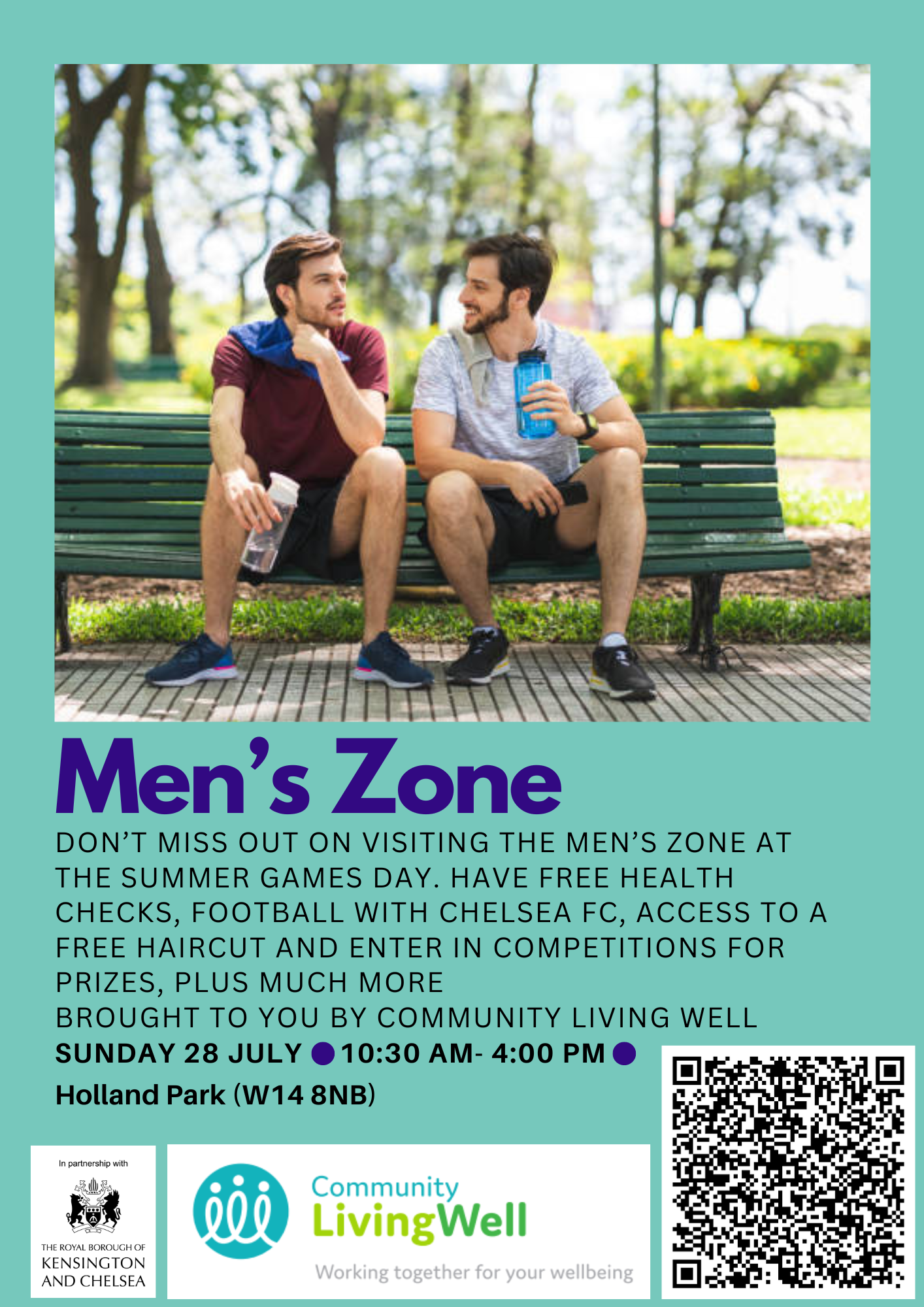
Author: Stuart Dent
Category: Uncategorised
Posted on: 15th July 2024
Mental Health Awareness Week 2024
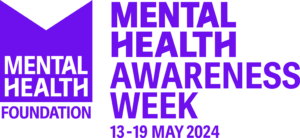 Mental Health Awareness Week (MHAW) 2024 takes place from 13 to 19 May, and the theme is “Movement: Moving more for our mental health”.
Mental Health Awareness Week (MHAW) 2024 takes place from 13 to 19 May, and the theme is “Movement: Moving more for our mental health”.
Movement is important for our mental health. But so many of us struggle to move enough. We know there are many different reasons for this, so this Mental Health Awareness Week we want to help people to find moments for movement in their daily routines. Going for a walk in your neighbourhood, putting on your favourite music and dancing around the living room, chair exercises when you’re watching television – it all counts!
(Source: Mental Health Foundation)
Moments for movement
To support Mental Health Awareness Week this year, we are asking our service users, colleagues and wider community to share what you do to keep moving.
We would love you send us a short video telling us about your walks, dance classes, gym sessions, housework routine – whatever it is that you do that gets you to stay active.
Share your video on social media and be sure to tag us on Twitter/X, Instagram, TikTok or Facebook so we can re-share your clips. Alternatively, you can send them directly to us and we’ll share them on our social media accounts.
If you do not want to make a video, just share your tips in writing or with a photograph.
When sharing your stories online, tag us and use the MHAW official hashtag #MomentsForMovement
Additional support
NHS guided videos
If you are looking for new ways to get moving, the NHS has instructor-led exercise videos, including aerobic exercises, strength and resistance training, pilates and yoga. Watch the videos here.
NHS Better Health
The NHS Better Health website can help you to make little changes to improve your overall health. They provide support with stopping smoking, drinking less alcohol, or losing weight.
Local activities
There are lots of free or low cost activities for you to get involved with in Kensington and Chelsea. RBKC has lots of information on their website.
Sport England – Get Moving
Tips, advice and guidance on how to keep or get active. Visit ‘Get Moving’.
Mental Health Support
As always, you can get help and support with your mental health and emotional wellbeing with Community Living Well. We offer counselling, therapy, peer support, a navigation service and employment support. Refer yourself quickly and easily online.
Author: Stewart Gillespie
Category: Community Living Well
Posted on: 24th April 2024
Become a Trainee Psychological Wellbeing Practitioner
 Join a mental health training course with the improved access to psychological therapies training programme, and become a Psychological Wellbeing Practitioner
Join a mental health training course with the improved access to psychological therapies training programme, and become a Psychological Wellbeing Practitioner
Psychological therapies services across London are recruiting trainee PWPs as part of the IAPT programme to deliver evidence based psychological therapies for people with anxiety and depression. PWPs provide brief structured supported treatments such as guided self-help.
PWP training is provided by University College London (UCL) and is full time. Trainees attend university one day a week and work in service the remaining 4 days a week. Trainees will be employed in an IAPT psychological treatment service. Training course fees on this programme are fully funded by the NHS. In addition, trainees will receive a salary from the London IAPT service where they undertake their 4-day a week placement over the year of the programme. In previous years, this has been a full-time employed position at NHS band 4.
This programme is an NHS-funded psychological professions training programme. It is a course condition that all students remain employed by an NHS Talking Therapies employer for the duration of the programme.
PWPs work with people across the adult age range.
We are keen to recruit a workforce that is representative of the diverse local London population.
Applicants should have experience of working with people with psychological, interpersonal or social problems; either through employed positions or formal volunteer roles.
The course is a postgraduate certificate and applicants are required to demonstrate aptitude to study at postgraduate level, either through degree level education or demonstration of academic equivalence.
As part of the application process trainees will be required to nominate two London IAPT services as their preference for training. All details about the application process are set out in the recruitment pack. This information is essential reading for successful applications.
Recruitment is via the UCL website ONLY at the following link: https://www.ucl.ac.uk/prospective-students/graduate/taught-degrees/low-intensity-cognitive-behavioural-interventions-common-mental-health-problems-pg
Please do not apply via the NHS jobs website
Recruitment opens at 10am on Thursday 25th April and close at 10am on Monday 13th May. This is for intakes that will start at the beginning of October 2024.
For more information about the course see: http://www.ucl.ac.uk/pals/study/masters/TPPPSYSLCB01
Read more about becoming a Psychological Wellbeing Practitioner or watch the video below:
Author: Stewart Gillespie
Category: Community Living Well, Talking Therapies
Posted on: 10th April 2024
Update: Self-Care service
KCSC have now received confirmation that funding for the Community Living Well Self-Care programme will not be continuing beyond the end of the current grant agreement. Unfortunately, KCSC need to close the Self-Care programme as a result. This only applies to the Self-Care programme managed by KCSC.
All Self-Care services overseen by KCSC will end on 31 March 2024. All referrals will be closed on 1 March. Several providers had already closed referrals for reasons of capacity. These will not re-open. Any clients already referred will continue to receive services until the end of March. KCSC will have very little day-to-day involvement with the wider Community Living Well programme after the end of March 2024.
All other Community Living Well services (Talking Therapies, Peer Support, Navigators and Employment Support) are still operating as normal.
If you need support with your mental health or mental wellbeing, you can refer yourself to Community Living Well quickly and easily by completing this form.
Author: Stewart Gillespie
Category: Community Living Well, Self-Care
Posted on: 13th March 2024
Talking Therapies: Myriam’s Story
 Myriam was looking for on-going support to help manage her mental health following time spent under psychiatric care. She was referred to NHS Talking Therapies. We spoke to her about her experience and why she found the therapy helpful.
Myriam was looking for on-going support to help manage her mental health following time spent under psychiatric care. She was referred to NHS Talking Therapies. We spoke to her about her experience and why she found the therapy helpful.
How did you hear about Talking Therapy? What made you seek support?
Well, my story with mental issues goes back to six years ago when I had a manic episode. I was sectioned into an NHS psychiatric ward, then transferred to a private hospital. After my episode I was really, really struggling emotionally and psychologically, so I went to stay with my family in France for a couple of years. I had suffered trauma and stress following a difficult divorce, and I would also suffer from paralysing anxiety attacks, usually around money worries.
When I came back to the UK in January 2020, I reached out to my GP and told them I would like some support as I was still very up and down. Of course, then the pandemic started, so I was offered online talking therapy sessions. I had my first series of sessions then, and I’ve since had another course of sessions. They were arranged online and over the telephone. I had 6-8 sessions I think, once a week to start with, or every other week if I couldn’t make it. They were flexible around me.
Can you talk me through how the sessions were run? What did they involve?
I was asked to answer a questionnaire before each session, so they could monitor if my mental state was better or worse than the previous session. It was structured well; the therapist was always asking me the same set of questions each time for consistency. Then we would go into whether something had happened since the last session.
I also remember that they provided links to further information or advice depending on what we had discussed in that session. For instance, I remember having issues with insomnia, so she was sending me ways of dealing with insomnia, or ways to manage alcohol, if that would be helpful. There were also links to things I could do to take care of my general wellbeing, like sport or art, things like that. I always had further links to things that might be helpful at the time.
How have the sessions helped you? Have you seen an improvement in your situation and feelings?
I’ve done a lot; I’ve taken on board yoga, meditation, mindfulness, breathing, discipline, so that’s what I carry on. The insomnia information was really helpful. Also, what helped a lot was planning my week. Sometimes it’s hard to plan my week because I’m quite impulsive, so it can be difficult. But basically, it’s about being very mindful of not taking on too much, saying ‘no’ to certain things, postponing certain things, being very aware of what makes me tired. Before, I could take on a full day and have zero space to recover, energy wise, so that really helped me make my own rules of doing things my way to pace myself.
You said you thought the therapist was very good during both sets of sessions. What makes you say that?
Obviously, you would expect them to be kind, but they were really very kind. They were also very good at explaining things, or providing an explanation for why they asked certain things or why we discussed certain things.
Also, the link between the practical part and the additional information was really helpful. They customised their links and advice to my story, it was a nice relationship.
Would you recommend talking therapy to other people?
Yes. Obviously since my episode, I’m even more interested in psychology, but I’ve started a deep personal development. I’m a real fan and believer of that; I think everyone should go to a therapist. We all have so many issues that we don’t even know, once you start uncovering it, then you realise then there’s even more.
Anxiety dealt with by yourself is like digging yourself into a hole, because you have no idea of how to come out of your own head. It’s like if you have fallen into a well and you’re trying to get out by yourself. You might get lucky and get out, but it takes a long time and is hard. But with help, you can climb out much faster.
What would you say to someone to encourage them to try talking therapy?
I always say ‘you don’t know what you don’t know’, so you should always try new things. Talking therapy should be part of an on-going regime.
For me, the recommendation came from a trustworthy source, which was my GP, so speak to them, find out more.
If you haven’t been diagnosed with something, or you don’t know the name of something, the jargon and language is too much. You have no idea if you are depressed, or if you have anxiety, bipolar, whatever. The line between them can be a bit blurred, and sometimes treatment is different, so it’s best to talk to someone.
Whether it’s talking therapy, whether it’s exercise, then this is what you want. Whatever it takes to feel better.
During her recovery, Myriam has rediscovered herself through art, which has led her to explore new opportunities in her career and her wellbeing…
When I had my episode and I was sectioned, I had also what I think was a spiritual awakening, an artistic calling. I now call it my artistic ‘coming out’, because I have no other way to describe it. I lived in an altered state of consciousness for about two weeks during my recovery, and it gave me this kind of vision. My family was completely panicked, but for me, I had the best time of my life there. Suddenly, I saw myself. My life’s purpose and mission was so clear. It was very deep, it was very transformational. It was awakening to myself. It’s only been six years, but it was a change of identity for me. It has been such a journey. I had this spiritual awakening. I knew I needed to seek ongoing support for my mental health, but I also knew I wanted to focus on my art and help myself heal through expressing myself creatively.
If you need support…
If anything in Myriam’s story sound familiar and you would like to try talking therapy, you can refer yourself quickly and easily online. You can use our helpful assistant, Wysa, who will guide you through the questions, or you can complete the standard form. Once you’ve submitted your details, someone will contact you within 5 working days to have a chat and get you the help you need.
This story was originally published in issue 12 of Community Living Well magazine. It has been edited for website purposes. You can sign-up to our mailing list to receive the magazine directly into your inbox.
Author: Stewart Gillespie
Category: Community Living Well, Talking Therapies
Posted on: 21st February 2024
How physical activity helps mental health
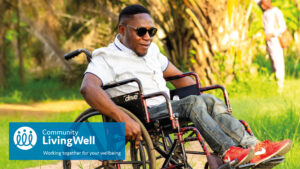 Taking regular exercise can have a huge positive impact on our mental health and wellbeing. We’ve highlighted some of the ways how physical activity helps mental health.
Taking regular exercise can have a huge positive impact on our mental health and wellbeing. We’ve highlighted some of the ways how physical activity helps mental health.
Recommended physical activity
The recommended amount of moderate physical activity we should be doing is two and half hours per week. This regular physical activity helps with many health benefits, hopefully leading us to live longer, healthier lives, which includes an improved mental health.
Don’t let the thought of exercise cause you additional worry and stress; it doesn’t mean you have to join a gym or complete a marathon! Exercise can be anything that gets us moving; from doing our weekly shop or cleaning the house, to dancing or going for a walk.
If you are living with a disability or you are not comfortable leaving the house, there are lots of suitable options available online. Disability charity, Scope, has information about exercising at home, or you can search for at-home workouts on YouTube.
Mood Boost
Studies show that physical activity has a positive effect on our mood. Any form of physical activity can help us to feel calmer and content. The benefits are more noticeable when our mood is lower than usual, so if you are living with depression, anxiety or stress, you are likely to feel an improvement in your mood if you take some form of exercise.
Reduce Stress
Stress affects us all at some point. Research shows that physical activity can be effective at relieving stress, and those who are more active tend to be less stressed than those who are less active.
Boost Self-Esteem
Taking regular exercise can help to make us feel good about ourselves. Once you’ve completed some form of physical activity, you will feel a sense of achievement, which makes us feel good. It can also help our physical health and appearance by keeping fit.
Increase Energy Levels
Regular exercise can increase our energy levels throughout the day and even enhance our ability to learn and memorise new things.
If you need additional support…
The Community Living Well Peer Support service arranges group walks in local parks, which is a great opportunity for you to take some exercise, get some fresh air and meet with people who may have similar experiences. You can refer yourself to the Peer Support service by completing this online form.
One You Kensington & Chelsea and One You Westminster also provide useful information, advice and opportunities to introduce physical activity into your daily routine.
Author: Stewart Gillespie
Category: Community Living Well, Peer Support
Posted on: 5th February 2024
New! Community Workshops

Join us for our FREE NHS Community Workshops
Open to all aged 16+
Our Community Workshops aim to promote evidence-based knowledge and support a healthier lifestyle and general wellbeing.
Each session includes a light physical activity, suitable for ALL abilities.
Information stalls with free resources also available!
Our current timetable of Community Workshops has now finished. Check back for more soon!
To find out more about Community Living Well services, including how to refer yourself, see How we can help.
Author: Stewart Gillespie
Category: Community Living Well
Posted on: 9th January 2024
Christmas Opening Hours
Here are the festive season opening hours for Community Living Well Talking Therapies:
Mon 18th Dec – Friday 22nd Dec:
Usual hours (Mon – Thurs 8am-8pm, Fri 8am-5pm)
Mon 25th and Tues 26th Dec:
CLOSED – Bank Holiday
Wed 27th – Fri 29th Dec
Gertrude Street – CLOSED
St Charles – Open 9am-5pm only
Mon 1st Jan
CLOSED – Bank Holiday
Tues 2nd Jan
Gertrude Street – CLOSED
St Charles – Open as usual (8am-8pm)
Wed 3rd Jan onwards
Usual hours at St Charles and Gertrude Street (Mon – Thurs 8am-8pm Fri 8am-5pm)
Community Living Well Peer Support are running activities during the festive season. Please see all groups and activities on our events calendar.
Our partners, SMART, have some activities over the festive period, including on Christmas Day and New Year’s Eve. Visit their website for details or click to view the poster:
Tips and Advice
Take time for yourself
– pay attention to how you are feeling. Track your mood and look after your emotional health. Mind has information on how to identify what you’re feeling and ways to try and manage these feelings.
– focus on what you enjoy. It could be doing something creative, watching your favourite film or TV show, or spending time outdoors.
– take a break from social media and the internet in general, like reading the news. Take part in an activity like we mentioned above and have a break from your phone.
– it’s ok to say ‘no’. If it’s difficult for you to take part in something or you’re invited to an event or meet-up that you don’t want to go to, then politely decline. You don’t need any additional worry.
Connect with others
If you are feeling up to it, connecting with other people can help boost our mood.
– arrange to talk to people over the phone or via video call if you don’t want to go outside. This might be a trusted friend or family member who you’re comfortable opening up to.
– go online and connect with other people who might be spending Christmas alone. You could try Mind’s online community, Side by Side.
– engage with your local community. Some local events might not be happening, but you may be able to find virtual events to join. Take a look at the Community Living Well events calendar and see if there are activities you’d like to try.
Choose to not celebrate, if that feels easier
– tell others about your plans so they know whether or not to mention Christmas.
– exchange any gifts in advance.
– stay off social media and try to avoid festive adverts on TV or online.
– eat the same foods and do the same activities as you would any other day.
For more information and tips, visit the Mind website.
If you need additional support, you can refer to the Community Living Well service here.
If you need urgent help with a mental health crisis, see our list of contacts.
Author: Stewart Gillespie
Category: Community Living Well, Peer Support, Talking Therapies
Posted on: 20th December 2023
Out now! Community Living Well Magazine Issue 14
We are pleased to share the latest edition of Community Living Well magazine.
Featured articles include:
- Looking after your wellbeing during winter
- How to be a good colleague
- Stay informed: Benefits changes
- Habits to boost your happiness in 2024
Plus, we hear about a recent experience of talking therapy and learn more about a therapeutic gardening group.
There’s also book reviews, information on peer support groups, and a directory of other local resources.
- Issue 14 December 2023 (best for mobile device viewing)
- Issue 14 December 2023 (best for desktop viewing)
We hope you enjoy reading this issue. If you have any suggestions or feedback about the magazine, please contact [email protected]
To sign-up to receive the Community Living Well magazine direct to your inbox, complete this form.
Author: Stewart Gillespie
Category: Community Living Well
Posted on: 11th December 2023




